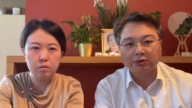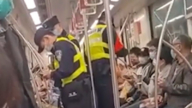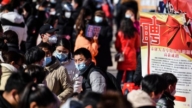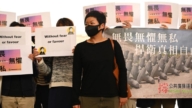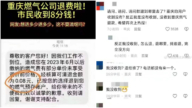【新唐人2013年05月22日訊】在大陸被稱為政壇「黑馬」的陸昊,今年3月,從團中央空降黑龍江,任黑龍江省代省長,成為目前大陸最年輕的省府首長。有媒體曝光,早在1985年,18歲的陸昊就在中南海喊出「不做改革旁觀者」。那麼,中共啟用這些具備改革意識的人士,是試圖改革了嗎?
3月25號,黑龍江政府網發佈消息,決定任命陸昊為黑龍江省副省長、和代理省長。
陸昊1967年出生於西安,高中時候已經加入了中共黨員。1985年,陸昊被保送進入「北京大學」的經濟管理學院,進校不到兩年,通過直選成為北大學生會主席。據大陸官媒報導,陸昊是當時西安唯一的中學生黨員﹔也是「文革」後,「北大」第一位經直選產生的學生會主席。
2003年1月,35歲的陸昊當選為北京市副市長,成為當時北京市最年輕的副市長﹔2008年5月,時年41歲的陸昊接任共青團中央書記處第一書記,成為最年輕的正部級官員。目前他是大陸最年輕的省長。
時事評論員司馬泰:「不管他啟用甚麼樣的人,(陸昊)67年(出生),也是45、6歲了,也不算年輕了。其實也談不上多大的突破。就是正常他要維護他的一代、二代、三代的接班人,所以他要栽培、要提拔,準備這麼一個梯隊。」
報導說,1985年11月,在中南海懷仁堂,陸昊作為學生代表,出席中共中央顧問委員會召開的一次座談會,陸昊發言說,「改革是艱難的創舉,不可避免會出現這樣或那樣的問題,但我們不能因此而停步不前。我們大學生不能做改革的旁觀者。」
但是,近年來,中國社會矛盾突出,陸昊的這種自覺,還能在他的從政路上運行﹖中共新領導人習近平啟用這些所謂的改革派人物,能緩解國內的衝突嗎﹖
時事評論員司馬泰認為,新官上任都急於高談所謂的改革,這似乎已經成為拯救共產黨的一個招牌了。
時事評論員司馬泰:「你不管他改甚麼,他覺得改革的這個旗號他必須打的,他不管是在輿論上,或者是在人事安排上,都要給人這種感覺 ,為甚麼呢﹖因為大家都知道共產黨已經大家都不信他了,共產黨它要想存活下來,一定要把自己扛上改革的大旗,來愚弄糊弄老百姓,糊弄這個世界,給人們製造這種幻想。」
3月13號晚上,習近平在政治局擴大會議上列出了「三條」措施,包括「三公」消費公開公示,和財產經濟收入申報公開公示,以及解決就業問題、以法治國等。香港《爭鳴》雜誌認為,習近平希望民眾能看到實效。
據了解,陸昊是現任總理李克強、和國家副主席李源潮的師弟,他們都是經濟學家厲以甯的學生。
時事評論員林子旭表示,北大、清華的這批學生,視野比以前的領導人開闊,他們或許表面上礙於中共的淫威,顯得乖巧,但是,林子旭說,真有個風吹草動,這些人很有可能成為反共的急先鋒。
時事評論員林子旭:「相信中共也非常明白這一點,但是中共也是沒有辦法。老一些的已經不能用了﹔像奴才一樣聽話的,往往又都是一些廢物。中共也只能是走一步看一步了。」
林子旭還指出,到了今天,中共一方面需要那些邪惡、陰狠的人為自己充實能量,另一方面又需要一些有能力、有思想的人控制局面,但是這兩類人又很難走到一起。因此,林子旭說,類似團派或江派這樣的權鬥會一直存在下去,而這種權鬥帶來的巨大消耗,必然會讓中共更快的崩盤。
採訪編輯/常春 後製/薛莉
Heilongjiang Acting Governor: “Don’t Be a Reform Bystander”
Lu Hao—the “dark horse” in the mainland political arena—
took the position of acting governor of Heilongjiang Province
this March, after working at the Communist Youth League
(CYL) Central Committee.
Lu Hao is the youngest head of a provincial government
in mainland China.
Media have quoted Lu Hao as saying in Zhongnanhai in 1985:
“Do not be a reform bystander”—he was then 18 years old.
The Chinese Communist Party (CCP) uses
such reform-minded people for their own means.
Is this a signal of reform from the CCP?
—Let’s take a look.
On March 25, Heilongjiang’s government announced
that Lu Hao had been appointed as the vice governor and acting governor of its province.
Lu was born in 1967 in Xi’an, and joined the CCP
when he was a high school student.
In 1985, Lu Hao was recommend for admission
to the Department of Economics and Management
at Beijing University, and after two years, he became the Students’ Union (SU) President through direct elections.
Mainland China’s official media reports that, Lu Hao was
the only high school student among Xian’s CCP members.
He was also the first SU President at Beijing University
who had taken the position through direct elections, since the Cultural Revolution.
In January 2003, Lu Hao became the Vice Mayor of Beijing
at 35 years old: the youngest in history.
In May 2008, Lu Hao took over as the first secretary
of the CYL Central Committee at age 41, becoming
the youngest ministerial-level official at that time,
and now he is the youngest Governor in mainland China.
[Sima Tai, Commentator]: “No matter what kind of person
the CCP appointed, Lu Hao was born in 1967 and
he is 45 years old; not young
—there’s not much breakthrough.”
“In fact, the CCP wants to maintain the
second generation of successors, and
this is why they cultured, promoted
and prepared for such an echelon.”
Reports say that Lu Hao had attended a seminar held by
the Advisory Committee of the CCP Central Committee
in the Huairen Hall in Beijing’s Zhongnanhai
in November 1985, as a student representative.
Lu Hao had said in the seminar:
“Reform is a type of initiative; it is very difficult.”
“There will be many problems during the reform;
however, we shouldn’t stop and we—university students—
are not reform bystanders.”
Many prominent social contradictions have appeared
in China over recent years—in this environment,
can Lu Hao put his ideas into practice in his political career?
Can the reformist figures appointed by the CCP’s new leader,
Xi Jinping, ease domestic conflict?
Commentator Sima Tai says, officials are eager to talk about
so-called reform, but it seems to be done to save the CCP.
[Sima Tai]: “No matter what’s going to be changed,
the CCP has to play the banner of reform,
whether it’s with public opinions
or with personnel arrangements.
It has to give people the feeling of reform—Why?
As we all know, the CCP understands that nobody believes it.
But it wants to survive, so it has to play ‘reform’ itself; that is,
create an illusion of reform to fool the public and the world.”
March 13th, evening, Xi Jinping listed the “three measures”
in the enlarged meeting of the Political Bureau,
including the publicity of government consumption;
the declaration and publicity of property income;
the employment problem; and the rule of law, etc.
Hong Kong’s Contention Magazine says, Xi Jinping
wants people to see the effectiveness of the ‘reform’.
It’s known that Lu Hao was a schoolmate of the current
Prime Minister Li Keqiang and Vice-President Li Lu Hao
in junior school, and that all three had been taught by
the economist Li Yining.
Commentator Lin Zixu says, this group of students
from Beijing University and Tsinghua University have
a more open view compared to the previous CCP leaders.
Lin says, they may be well-behaved on the surface
because of the CCP’s despotic power, but they’re likely to
become the vanguard of anti-communism
when there’s sign of real trouble with the CCP.
[Lin Zixu, Commentator]: “I believe that the CCP is also
well aware of this situation but it has no solutions;
the older officials can’t be used and the lackeys are tractable
but are wastes—so the CCP can only take things step by step.”
Lin Zixu adds that, currently, the CCP needs those evil people
on one hand, to enrich their own energy; on the other hand,
it needs some thoughtful people to control the situation,
yet these two types of people can hardly come together.
Therefore, the power struggle between the CYL faction
and Jiang’s faction, or similar ones will always exist, Lin says
And these power struggles will bring such enormous
internal friction, that it will accelerate the CCP’s downfall.



